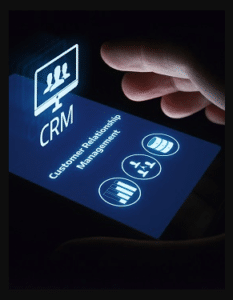Customer Relationship Management (CRM) – In today’s competitive business landscape, one of the most crucial factors for sustainable growth is ensuring an exceptional customer experience.
Happy and satisfied customers are more likely to become loyal advocates for your brand, leading to increased revenue and positive word-of-mouth marketing.
Customer Relationship Management (CRM) plays a pivotal role in enhancing customer experience, and in this article, we will explore how businesses can leverage CRM effectively to create lasting impressions on their customers.

Introduction
At its core, CRM refers to the strategic approach of managing interactions and relationships with customers. It involves utilizing technology, processes, and data to understand customer preferences, behaviors, and needs better. By leveraging CRM solutions, businesses can streamline customer interactions, improve communication, and deliver personalized experiences that resonate with their target audience.
Understanding CRM (Customer Relationship Management)
CRM is not just a software or a tool; it’s a comprehensive approach that revolves around building strong customer relationships. It enables businesses to gather, store, and analyze customer data, providing valuable insights into their purchasing habits and preferences. This, in turn, helps businesses tailor their products and services to meet individual customer needs.
The Importance of Customer Experience
In a digital age where consumers have numerous options at their fingertips, providing a memorable customer experience is essential. A positive customer experience fosters trust and loyalty, leading to repeat business and increased customer retention. On the other hand, a negative experience can drive customers away and even lead to negative reviews, which can be damaging to a company’s reputation.
How CRM Can Improve Customer Experience
-
Personalized Communication
CRM allows businesses to segment their customer base and create targeted marketing campaigns. By understanding customer preferences and behaviors, businesses can deliver personalized messages that resonate with individual customers, making them feel valued and understood.
-
Efficient Issue Resolution
CRM systems enable efficient customer support by centralizing customer data, interactions, and previous concerns. This helps support agents access relevant information quickly, leading to faster issue resolution and higher customer satisfaction.
-
Enhanced Customer Engagement
CRM platforms often include features that facilitate customer engagement, such as email marketing, social media integration, and customer feedback mechanisms. These tools help businesses stay connected with their customers, promoting two-way communication and fostering stronger relationships.
-
Data-Driven Decision Making
By analyzing customer data and feedback, businesses can make data-driven decisions to enhance their products and services. CRM provides valuable insights into customer preferences, pain points, and expectations, enabling businesses to align their strategies with customer needs.
Selecting the Right CRM System
While the benefits of CRM are evident, selecting the right CRM system is crucial for its successful implementation. Here are some key considerations:
-
Identify Your Business Needs
Evaluate your business requirements and choose a CRM system that aligns with your objectives. Look for features that are essential for your specific industry and customer base.
-
Integration with Existing Systems
Ensure that the CRM system integrates seamlessly with your existing software and systems. A well-integrated CRM system can streamline workflows and increase productivity.
-
User-Friendly Interface
A user-friendly interface is vital for the successful adoption of a CRM system by your team. Prioritize platforms that are easy to use and require minimal training.
-
Scalability and Customization
Choose a CRM system that can grow with your business. Scalability is essential as your customer base expands, and customization capabilities allow you to tailor the CRM to your unique needs.
Implementing CRM Effectively
Once you’ve selected the right CRM system, its successful implementation is key to reaping its benefits.
-
Training Your Team
Provide comprehensive training to your employees to ensure they can effectively use the CRM system. Proper training increases user adoption and maximizes the system’s potential.
-
Regular Data Maintenance
Maintaining accurate and up-to-date customer data is crucial for effective CRM usage. Regularly clean and update your database to avoid errors and redundancy.
-
Monitoring and Analytics
Leverage the analytics features of your CRM system to monitor customer interactions and track performance metrics. Analytics can provide valuable insights to optimize your customer experience strategies.
Overcoming Challenges in CRM Implementation
While CRM can transform customer experience, its implementation can face certain challenges:
-
Resistance to Change
Introducing a new system may face resistance from employees accustomed to old processes. Communicate the benefits of CRM and provide support to overcome this resistance.
-
Data Security and Privacy Concerns
Customer data security is paramount. Ensure that your CRM system adheres to the highest data security standards and complies with relevant privacy regulations.
-
Cost and Resource Allocation
CRM implementation requires an investment in software, training, and maintenance. Allocate resources appropriately to ensure the successful adoption of CRM.
Real-Life Success Stories of Improved Customer Experience with CRM
Include examples of companies that have successfully leveraged CRM to enhance customer experience. Highlight how these businesses implemented CRM strategies and the positive impact it had on their customers.
Conclusion
In conclusion, CRM is a powerful tool that can significantly improve customer experience and foster long-lasting relationships with customers.
By using CRM to personalize communication, efficiently resolve issues, enhance customer engagement, and make data-driven decisions, businesses can create a customer-centric approach that drives success.
Selecting the right CRM system and implementing it effectively are essential steps to ensure optimal results.
Read More :
- CRM and How to Choose the Right One
- The Future of CRM: What You Need to Know
- Customer Retention 101: Using CRM to Keep Your Clients Happy
- CRM vs ERP: Which
 Pmbmalahayati.id Media Informasi Terupdate Masa Kini
Pmbmalahayati.id Media Informasi Terupdate Masa Kini





